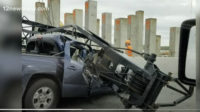Construction Safety
OSHA Penalties in Fort Lauderdale Crane Crash Target Rigging Contractor

Survivor of car crushed by fallen tower crane section at a Fort Lauderdale, Fla., high-rise project looks back as she walks away. OSHA has proposed fines related to the climbing mechanism, connecting hardware and wire rope.
Image via Fort. Lauderdale Police Dept. video
Federal safety officials have proposed penalties against a crane rigging contractor and a tower crane owner related to the April tower crane accident in Fort Lauderdale, Fla., in which a rigger died in a long fall from a high-rise apartment building and a tower crane section came crashing down on motorists.
Rigger Jorge De La Torre, 27, was killed, and several motorists had their cars damaged. Some of the accident and its aftermath was captured on video released in July by the Fort Lauderdale police department.
The Occupational Safety and Health Administration proposed a penalty of $39,000 against Phoenix Rigging & Erecting, Mableton, Ga., for three serious violations. OSHA accused the company of failing to have a qualified person inspect equipment and connection hardware prior to each shift.
Specifically, OSHA claimed, the company failed to discover corroded and cracked pins, bolts and improperly tightened end connections. Furthermore, the company also failed to check the U-bolt (clamps/clips), bolts, pins, thimble and wire rope of the Terex Top Climbing System-Trolly Rail Guide.
Finally, OSHA cited Phoenix Rigging for failing to ensure that all staff on a climbing platform—where a section to be inserted into the mast sits and riggers make final connections—were properly tied off.
The two proposed serious citations—and proposed fines for a total of $23,000—against Cannonsburg, Pa.-based Maxim Crane Works involved its alleged failure to have a qualified person inspect the same wire ropes and connecting hardware.
The OSHA citations and proposed penalties do not state exactly what triggered the failure or describe the failure sequence. A post-accident photo of the climbing unit, a video description by the rigging crew boss and a police department report pointed to the potential role of a climbing platform cable.
Neither Phoenix Rigging & Erecting nor Maxim Crane Works could immediately be reached for comment about whether they will contest the proposed penalties.
Referring to De La Torre, OSHA Area Director Condell Eastmond said in a statement that “if these companies had made safety a priority, a young man’s family, friends and co-workers wouldn’t be facing this preventable loss. Construction employers are responsible for ensuring that workers use fall protection in hazardous situations, and we will hold all employers accountable for failing to provide safe working conditions.”





